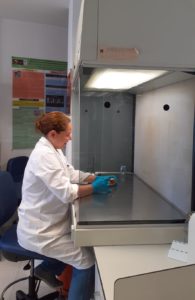At MAFA we are in celebrating two things at once. The first is that we have started to Myco-Brow, a pioneering research to design biofertilizers and biopesticides from alperujo, one of residues of the olive oil production. The second is that we announce the incorporation of Dr. Gloria Andrea Castro Silva, who joins our R&D department as a researcher in this novel project, granted by the CDTI (Centre for the Development of Industrial Technology) of the Ministry of Science and Innovation.
With an investment of almost one million euros, MAFA’s Myco-Brow will try to find bioactive components in this type of olive grove waste. With this, it will not only be possible to value and take advantage of them, but also to contribute to greater efficiency and sustainability of the olive agribusiness. Moreover, the sector has in the alpeorujo and that side product is one of the most important and difficult to treat waste. Considering that an average oil mill produces 20,000 tons of this by-product per season, MAFA’s Myco-Brow research hopes to provide a sustainable, clean, profitable and efficient treatment to the alperujo. At the same time, further optimize the circular economy of olive processing plants, one of the most important agro-industries in Andalusia and Spain.
Taking advantage of the alpeorujo for the design of biofertilizers
«The aim of this pioneering research is to enhance the alperujo through the design of biofertilizers and biopesticides. How? Transforming it with beneficial microorganisms for its application in agriculture. With this, we promote the improvement of the fertilization processes of degraded ecosystems and the protection of crops. Moreover, we reduce the environmental impact of the constant accumulation of alperujo, which currently does not have a clearly defined use”, explained the executive director of MAFA, José Carlos Sánchez Gálvez. The importance of the research lies in the fact that it responds to one of the biggest economic and environmental problems of the olive sector during the process of production of the olive oil.
The agribusiness linked to the olive grove has greatly improved and optimized processes. In fact, the two-phase continuous extraction system has managed to reduce the consumption of water and energy to obtain olive oil and the use of other by-products. For this reason, MAFA’s Myco-Brow research hopes to also contribute to a more sustainable agriculture. An agriculture without residues, in accordance with current European legislation and the demand of consumers, who are increasingly more aware about the residue and sustainabilty.

The Dr. Gloria Andrea Silva Castro.
Gloria Andrea Silva with the Myco-Brow
To carry it out, MAFA has the incorporation to the R&D department of Dr. Gloria Andrea Silva Castro. In it, she will develop the technical and practical research tasks at the laboratory level, for the subsequent escalation of it in a pilot plant.
Silva Castro is a doctor in environmental sciences and technologies from the University of Granada (Institute of Water, Department of Microbiology) and has more than ten years of experience in research. She is a researcher in eleven projects related to the treatment of polluting water and soils, desalination and bioremediation. In addition, she is an expert in microbiology and molecular biology techniques and has published 25 scientific articles.
Myco-Brow: Myco Biorremediated Olive Waste
Myco-Brow is the acronym of ‘Myco Bioremediated Olive Waste’, from the research project ‘Obtaining Bioactive Compounds from Bioremediation processes of Industrial Olive Waste and Evaluation of its Biostimulants and Biopesticide activity’. This innovative R&D project will be carried out in the Aceites Sierra Sur company, parent company of the Sierra Sur Group of which MAFA is part of. The research has the collaboration of the Rhizospheric Fungi Biofertilization and Bioremediation Group of the Zaidín Experimental Station (CSIC); from the group of Biotechnology and Chemistry of Natural Products the Institute of Agrarian Science and the Institute of Natural Products and Agrobiology (CSIC); of the BIOPLAG integrated by the group FQM-340 of the University of Granada.




